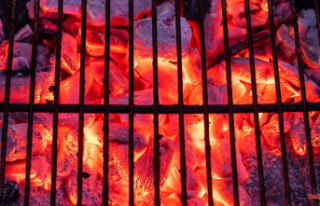Don't sugarcoat it: it's becoming difficult to quickly replace or upgrade expensive oil or gas heating systems these days. One should consider it nonetheless. What is suitable for which house, is it worth replacing, upgrading to hybrid heating or investing in solar thermal energy?
Do you have oil or gas heating - and are you worried about high energy prices and the uncertain supply situation? Understandable. And unfortunately it has to be said that no one can take away this worry from you in the short term. But you do have opportunities to do something. For example, you can upgrade or replace the heating system to curb price increases.
How can I replace my gas or oil heating system?
In detached and semi-detached houses, the heat pump is currently the first choice if you want to replace your existing oil or gas heating system, says Tim Gessler, editor and heating expert of the "SBZ Sanitary.Heating.Klima" trade magazine. In recent years, the heat pump has evolved from a niche product to a trend product among heating systems in private buildings - also with support in the form of good state subsidies.
The heating system with heat pump obtains a large part of its energy free of charge from the environment. Depending on the variant, it extracts heat from the ground, the ambient air or the groundwater. According to the Federal Association of Heat Pumps, around three quarters of their energy is obtained in this way. However, a purchased share of electricity is required to operate the pump and its drive.
"Another alternative is wood heating, usually a pellet boiler." It can also completely replace oil or gas heating for heat in the living room and for hot water preparation.
For both heating technologies, you have to reckon with costs of at least 20,000 to 30,000 euros. In addition, there may be costs for conversions that are necessary in order to be able to operate the systems efficiently. For example, a radiator replacement.
A third option is to switch to district heating. However, these are mainly found in densely populated areas and an energy supplier must be prepared to expand its network and lay new connections. "Then that is of course a viable and good option," says the heating expert.
Is every house suitable for a heat pump or wood heating?
Every heating system must match the building: the size and structure of the house, the number of residents, the orientation of the roof, radiators or underfloor heating and many other factors play a role in the question of which heating system is the best.
A heat pump, for example, cannot be used in every existing building, even though manufacturers have increasingly developed models for higher flow temperatures in recent years. Depending on the condition of the house, however, the insulation of the roof, facade, windows or basement ceiling must be improved or surface heating must be used.
And for the brine-water variant, for example, access to the garden plays a role, because it requires digging in the ground with heavy construction equipment.
With a pellet heating system, one of the factors is the space for the pellet store. "That's why the classic exchange of oil heating for pellet boilers is also necessary," says Gessler. You can convert the old oil storage. If you replace a gas heater, you must be able to offer the storage space in the house again.
Is the swap worth it?
The heating alternatives allow greater independence from oil and gas. The high costs for the new systems can be reduced with high government subsidies: when replacing an oil-fired boiler with a heat pump or a wood-fired central heating system, 45 percent of the investment costs are reimbursed. When replacing gas heaters 35 percent.
"But you also have to note here: All energy purchase prices are currently rising, whether it's gas, oil, district heating or electricity, pellets or wood chips," says Norbert Azuma-Dicke, Head of Policy and Strategy at the Federal Association of the German Heating Industry (BDH). "So you will have the energy price increase anyway." They can currently only be dampened with the conversions.
For example, those who want to switch must also be aware: "The heat pump in my house must be able to work efficiently so that there are also savings in running costs with the current electricity tariffs for heat pumps," says Norbert Azuma-Dicke.
An alternative to completely replacing oil or gas heaters is to upgrade them to hybrid heaters. What does that mean?
A hybrid heater uses multiple energy sources, typically oil or gas along with renewable energy. The system can be compared to hybrid cars: These are powered by electricity and petrol or diesel.
First of all, the heating systems use renewable energies to generate heat and hot water. Only in times of very high heat demand, when this energy is not sufficient, are oil or gas switched on. This significantly reduces their consumption.
"The classic hybrid solution, which is also subsidized by the state, is the combination of an oil or gas condensing boiler plus a solar thermal system," says Tim Gessler. "If you have a functioning heating system and want to do a little something, solar thermal is definitely an option for you."
Is investing in solar thermal worth it?
According to Tim Gessler, you can get a solar thermal system that heats water for everyday use from solar energy for around 5,000 euros. "Although the investment costs are lower compared to replacing the oil or gas heating system, you also save less energy," he says. "If you pack larger systems on the roof, which also support the heating, you quickly end up with 15,000 euros and more."
In an older detached house, supplementing an existing gas boiler with solar water heating can lead to around ten to 20 percent less gas consumption, depending on the insulation standard. If the solar thermal system also supports heat generation for the heating, "30 percent and of course more are also possible".
Here, too, there is a subsidy for the costs: Anyone who installs a solar thermal system is reimbursed 30 percent from the Federal Subsidy for Efficient Buildings (BEG). Further regional funding options can be researched, for example, via the federal funding database.
What about more modern oil and gas heaters - can't I save a comparatively large amount of energy with them?
In most cases, new gas and oil heating systems work with condensing technology. The exhaust gases are cooled to such an extent that the water vapor contained in them partially condenses to form liquid water. In addition to the normal yield, the energy contained in the steam can also be used for space heating.
"Condensing technology has very high levels of efficiency. This means that the energy source used is used very efficiently with little loss," says Frederic Leers, spokesman for the Federal Association of the German Heating Industry (BDH).
The taxes on the savings potential vary, which in turn depends on the conditions of the respective system in the respective house. According to the consumer advice center of North Rhine-Westphalia, a modern condensing boiler uses the fuel 10 percent better under the right conditions in the house. "If you modernize an outdated gas heating system and swap it for a modern condensing boiler system, you have savings of 15 to 20 percent," says Leers.
Tim Gessler believes savings of 10 to 20 percent are possible. "But it can also be less or maybe even more. It's difficult to look at this in isolation, because the calorific value effect depends, for example, on the return temperature in the heating system." And Gessler adds: "You have to be aware that this is not the most sustainable solution." After all, you would stay with the energy source gas. "No one is currently betting on gas prices as to how high they will rise," says the energy expert. "You stay with one foot in trouble."
However, this variant has one major advantage: the necessary infrastructure is already in place. An exchange can - if you get the device and craftsman - so go quickly. But you can't always get by without retrofitting. For example, the chimney may have to be converted because of the low exhaust gas temperatures that occur with condensing boiler technology.
According to Gessler, you can get a condensing boiler for around 8,000 euros - plus the cost of conversions.
I have an older heating system, can I keep it and add solar thermal?
In such a case, Norbert Azuma-Dicke from the BDH advises replacing the old low-temperature boiler with condensing technology as a first step. "This enables you to achieve energy savings of around 15 percent." If solar thermal energy is added directly or later, a total of up to 30 percent energy savings are possible. Tim Gessler would also only consider adding a solar thermal system if "the existing heating system is still relatively new".
Can it all be done quickly before the start of the next heating season?
All heating technologies currently require patience. The craftsmen's order books are full, with Leers speaking of a lead time of at least 17 weeks in mid-July. "In addition, there are sometimes bottlenecks in production, on the one hand because of the increased demand, but also because of the currently disrupted supply chains."
Things are looking particularly bad in some segments. According to industry expert Gessler, the delivery times for heat pump manufacturers are between six months and one year (as of July). "There are certainly small providers who are still able to deliver - but the question is, of course, for how long," says the trade journalist.
"In general, I would say that if someone can swap their oil or gas heating system for a heat pump before winter, then they're in luck," says Gessler. "But that doesn't mean that you shouldn't try, because the winter after next is coming."












